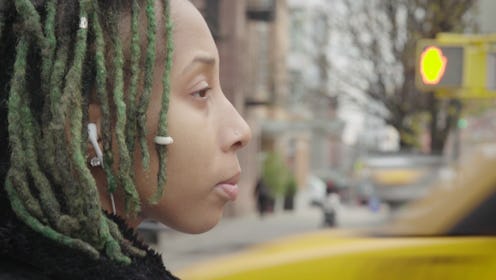News
Why Some Black Girls Aren't Finishing School

Last year, the White House launched an initiative that aims to educate girls around the world. Let Girls Learn is an important campaign by the Obamas which seeks to lead to greater economic security for about 62 million girls and their families.
But civil rights advocate Kimberlé Crenshaw says there are girls in our own backyard who are not getting the quality education they deserve, and the women most likely to be disadvantaged are black girls and girls of color. For the latest installment of Bustle’s NSFWomen docuseries, Bustle talks to young black women about the barriers they face when trying to get an education.
Janelle DeBique juggles school, cheerleading, working, and taking care of her brother. It’s a full plate for the 17-year-old, who is also working on her college applications. After long subway trips and homework, she’s left with about four hours of sleep before she wakes up and does it all over again.
“I usually have to pick up my brother after school. And it takes me about an hour and a half to get to his school,” DeBique tells Bustle. “I had to learn how to manage my time a little bit better. I definitely learned how to take care of other people cause I can't just pick him up. I have to pick him up, watch him, feed him, for the most part.”
DeBique’s story is similar to those of other young girls who have to balance familial responsibilities and their education. “Childcare responsibilities — for girls in particular, not only girls who are parenting, but girls who are taking on responsibilities of other parents — sometimes get them pushed out of school, because it's difficult to do that and also be in school in the ways that you have to be in school in order to stay there,” Crenshaw tells Bustle.
There are numerous other reasons black girls are “pushed out” of school. Monique Morris explores this problem in her book Pushout: The Criminalization of Black Girls in Schools. Morris tells Bustle that a major contributor is the deeply embedded stereotypes society has about black women. “When black girls are presenting themselves, often their presentation of femininity may not align with some of the more dominant notions of femininity,” Morris says. “They [society] tend to think about black girls as sassy, and loud, combative, hypersexual, or domestic.”
These words have a lasting negative impact on black girls. Internalized biases by some administrators and teachers result in black girls feeling uncomfortable or unwanted in school. The young women Bustle interviewed felt unwelcome because they feel their educators view them as behavioral problems, underestimate their abilities, or subjectively punish them.
Seventeen-year-old Lili Mauras, who is Hispanic, says she has seen firsthand how black girls are treated in her school. “They [educators] think that ‘Oh, because she's black, she's going to act ratchet or ghetto or act out.’ But it's not because she's black or because he's black. It's because you don't know what's going on at home. They don't actually take the time to sit us down like humans, like children.”
The statistics on black girls and education are sobering. According to the Office of Civil Rights, 12 percent of all African American girls in school received an out-of-school suspension in the 2011-2012 school year — that’s six times the rate of white female students. And black women have it hard from the get-go. African American women have higher rates of poverty than white men or women, at all levels of education, according to data from the U.S. Census Bureau.
And among African American women who are 25 and older and without a high school diploma, 43 percent are living in poverty. This staggering statistic is compounded by the fact that a large number of African American are disproportionately reliant on the income and the social stability of their mothers, Crenshaw tells Bustle. (And let’s not forget about the fact that women earn less than men, and the wages of black women are all the more suppressed when compared to wages of white women.)
When it comes to education, black girls are fighting institutionalized racism, gender biases, economic disadvantages, and add on the other struggles most all adolescents face in school, such as bullying and peer pressure, and you create, as Crenshaw says, a perfect storm for black girls to drop out of school.
If you’re interested in learning more about how to empower black girls, organizations like Girls for Gender Equity, Black Girls Rock, and Uniquely You offer more information.